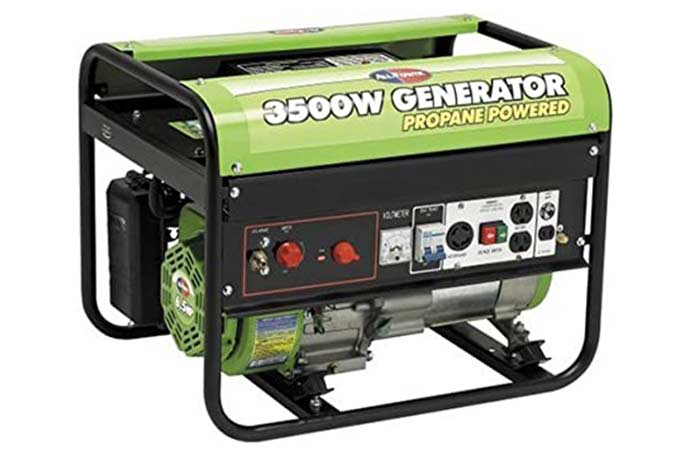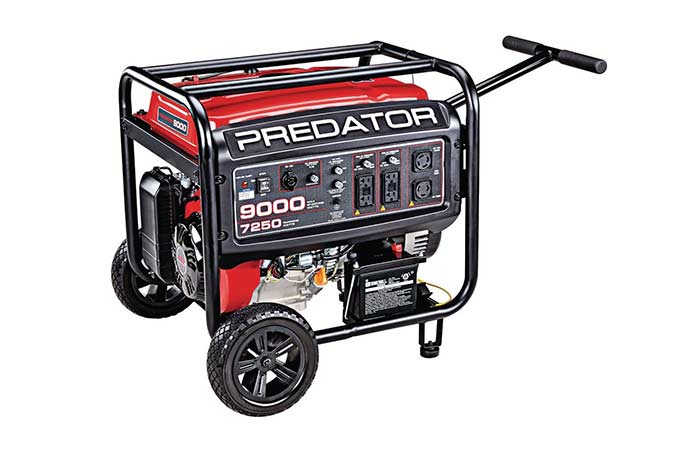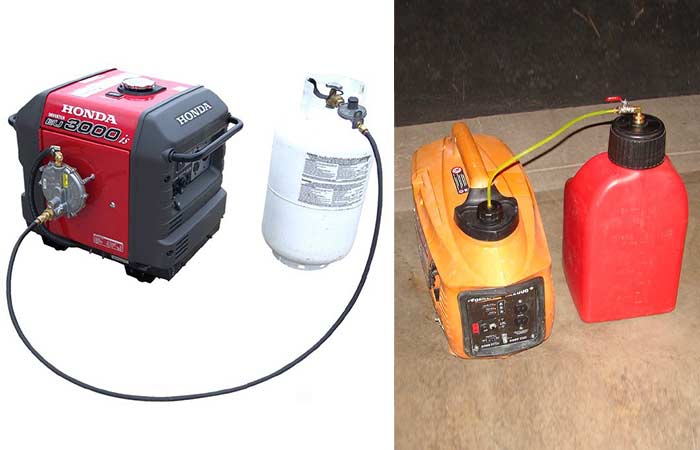Choosing between a propane and gas generator is a highly subjective aspect as each type of generator is suited to certain conditions. The two types of generators differ in terms of the availability of fuel, run time, maintenance, response to climatic conditions, efficiency and cost.
In our expert view, gas generators are the better of the two thanks to the availability of gasoline and its efficiency as well. Beyond that, a gasoline generator is relatively easier to use and fix when it breaks down. However, propane generators outdo the gasoline ones in terms of the longer run time and the fact that propane can be stored for long without going stale.
Propane vs Gas Generators
| Propane Generator | Gas Generator | |
| Cost | Low initial cost, high running cost | High initial cost, low running cost |
| Fuel Availability | Propane is easily available. | Gas is much more available. |
| Run time | Long run time per tank. | Relatively short run time per tank. |
| Maintenance | Complicated mechanics. | Simple mechanics. |
| Climate and natural disasters | Propane tank susceptible to freezing. | Doesn’t freeze but highly flammable. |
| Efficiency | More efficient. | Less Efficient. |
| Noise level | Low noise | Relatively higher noise |
The two types of generators differ in the following ways:
Cost and Efficiency
Propane will produce more energy per unit of fuel compared to gasoline. This makes it much more efficient. Also, it produces less pollutants when burning making it much better for the environment. However, propane burns faster than gasoline for the same period of time. Given that it costs more than gasoline and also burns faster than gasoline for the same level of the load, gasoline is the better option when it comes to the cost of fuel.
Another important aspect when it comes to the cost of the two generators is the initial cost. Propane generators, being less popular than their gasoline counterparts, are cheaper. The high demand and popularity of gasoline generators have made them costlier.

Fuel Availability
When it comes to the availability of fuel, you have to choose the one that’s most available. This is to ensure you don’t stay in the dark when the grid supply fails and your generator is also out of fuel.
In this regard, gasoline is the most available of the two fuels given the high demand it has. You can walk into any gas pump and you will get yourself some of it. The problem with gas is that the gas pumps rely on the electricity as well. If, therefore, there’s a power outage, the gas pump won’t be of much use. The alternative is always keeping some gas on hand for the emergencies. This has the problem of gas being highly flammable and degrading after long periods of storage.
Propane, on the other hand, isn’t as easily available as gasoline but its lifetime is indefinite as you can store it for long periods without it going stale. The downside to using propane is that it needs plumbing between its tank and the generator. This, however, allows for the use of a larger tank than what you would have for gasoline.
Maintenance
When it comes to maintenance, propane generators tend to have more complex mechanics compared to gasoline ones. This makes them difficult to troubleshoot at home without the input of an expert. As such, you need to choose between the two types of generators knowing how comfortable you are with either in the case of an emergency.
When it comes to storing the generators for a long period, the propane generator will not require any special steps since its fuel won’t go bad after a while. You simply store it away and you’re good to go. For the gasoline generator, you need to drain the fuel from the tank or add a stabilizer before storage.

Run Time
Propane has a better runtime compared to gasoline and this occurs in two ways. First, gasoline generators come with a built-in tank that’s small and will require to be refilled several times over if the generator will be running for a long period of time. On the other hand, propane generators, although they also have a built-in tank, can be hooked on to a larger tank for a longer supply. The same method can’t be used on gasoline given it high level of flammability.
The second way propane gives you a better run time is in the amount of energy generated per unit of fuel. While propane will give you 2,490 BTUs per cubic foot, gas gives you 1,040 BTUs per cubic foot. Essentially, you will be burning more than twice the amount of gasoline just to get the same energy as what you get from a cubic foot of propane.
Natural Disasters and Climate Changes
Your generator, being outdoors, needs to be protected enough from the elements to ensure its longevity and provision of power in difficult times like during a storm. For the two types of generators, you need to know that propane easily freezes when temperatures drop to around 0°C (32°C). Thus, if you live in a cold climate, gasoline is the better fuel.
If your area has many natural disasters such as wildfires, earthquakes and storms, you’re better off with a propane generator as gasoline is very flammable and could easily worsen the disaster when it catches fire.
Noise levels
Propane generators are usually quitter than their gasoline counterparts. Propane generators are often butted against the home hence the noise level is muffled up making for a quiet user experience. Gasoline generators, on the other hand, are often free-standing and hence louder.
As can be seen here, the choice between propane and gasoline generators is a subjective one which depends on the cost and manner of use. If you want to spend less buying and more running the generator, propane generators are for you. If you want to spend more buying and less running the generator, gasoline is the better option. If this decision is too hard, consider a generator that runs on both fuels to enjoy the best of both worlds.
Further Reading
